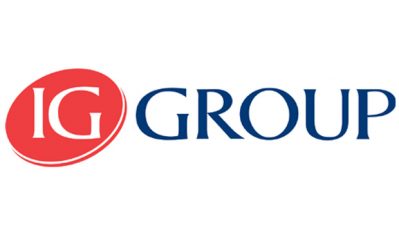 Spread betting and contracts for difference (CFD) provider IG Group Holdings has reported a year-on-year decline in revenue and profit in the first six months of its financial year, primarily due to the impact of new European Securities and Markets Authority (ESMA) regulations.
Spread betting and contracts for difference (CFD) provider IG Group Holdings has reported a year-on-year decline in revenue and profit in the first six months of its financial year, primarily due to the impact of new European Securities and Markets Authority (ESMA) regulations.
Net trading revenue for the six months through to 30 November 2019 amounted to £249.9m (€292.8m/$324.8m), a slight decline of 0.44% on £251.0m in the same period in the previous year and slightly less than IG Group had forecast last month.
IG Group drew most of its revenue from over-the-counter leveraged activities, with £239.5m of total revenue coming from this area of the business. Exchange traded derivatives accounted for £7.8m of overall revenue, while stock trading and investments contributed £2.6m to the total.
The provider put the decline in revenue down to the impact of the new ESMA measures, which came into effect in Q1 of FY19. ESMA banned the sale of binary options to retail clients in July 2018, and in August last year placed a number of new restrictions on the sale of CFDs.
Both measures came into effect during the latter part of the first quarter of 2019, and though ESMA lacks the power to implement permanent bans on either of the products, 24 regulators in European Union countries have moved to ban binary options sales permanently, while 17 have introduced restrictions on CFDs.
However, despite the new measures having a negative impact on IG Group, the provider upped its spending in the period in order to support its longer-term strategic initiatives.
Total operating expenses increased by 11.6% year-on-year from £122.1m to £136.3m. Prospect acquisition was the provider’s main outgoing in H1, with spending here up 10.1% to £39.1m.
Business administration costs were also up 6.2% to £27.4m, while technology spend climbed 3.8% to £27.2m and sales and client management rose 21.3% to £13.1m. However, IG Group was able to make savings on its premises costs, with spending down 41.5% to £3.8m.
This higher spending meant that operating profit for the first half fell 11.0% to £100.1m. Profit before tax slipped 10.0% to £101.2m and, despite IG Group paying less tax that in the previous year (£18.8m), profit for the period was down 10.0% from £91.4m to £82.4m.
However, looking forward to its 2020 financial year, IG Group said it expects to return to revenue growth, though operating expenses are also forecast to climb by around £30m for the future period.
“We are now six months into the delivery of our multi-year strategy and are on track to deliver on the medium-term growth targets we have set ourselves,” IG Group chief executive June Felix said.
“Early indications are very encouraging with continued growth in the client base in our core markets, and convincing progress in the areas identified as significant opportunities.
“I am very much looking forward to continuing the delivery of our strategy, and also to welcoming Mike McTighe as chairman of IG Group in February.”
Felix added: “I believe that IG is in an excellent position to exploit our scale, skills and technological capability, to pivot into new product lines, to expand our geographic reach and to serve new client segments, as we continue to focus on delivering sustainable growth and attractive shareholder returns.”
Meanwhile, IG Group has announced that Paul Mainwaring is to step down as its chief financial officer later this year to retire.
Mainwaring has served as a finance director of UK-listed businesses for almost 20 years and has informed the IG Group board that he wishes step back from executive roles as he approaches this milestone.
IG Group has launched a search to identify a replacement, though Mainwaring will continue in his role until an appointment has been made. Mainwaring’s official departure date will be announced in due course.












